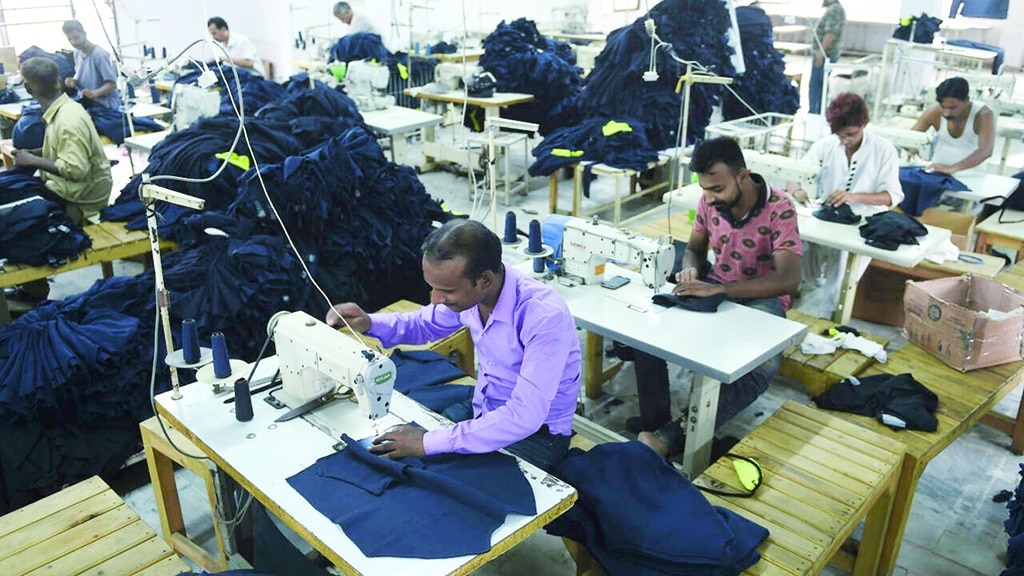ISLAMABAD: Pakistan's textile exports are set to dramatically dip as the sector is hobbled by a nationwide energy crisis forcing daily power cuts on factories, with an industry leader warning about "a state of emergency" for the manufacturing hub. The South Asian nation is in the midst of a dire economic crisis, with runaway inflation, a depleted rupee and dwindling foreign exchange reserves hampering energy imports.
Meanwhile a heatwave has caused a surge in electricity demand, leaving a shortfall of over 7,000 megawatts-one-fifth of Pakistan's generation capacity-on some days this month, according to government figures. The energy shortage has hit Pakistan's vital textile industry, which supplies everything from denim to bed linen towards markets in the US and Europe, and accounts for 60 percent of the country's exports.
"The textile industry is in a state of emergency," Qasim Malik, the vice president of the Chamber of Commerce in the manufacturing hub of Sialkot, told AFP. With authorities forced to ration the power supply with staggered blackouts, Malik said the "unannounced and unscheduled" outages disrupt the textile supply chain, which is "causing millions of rupees of losses". "Should the power cuts persist there could be a decline of more than 20 percent in exports," warned Sheikh Luqman Amin of the Pakistan Readymade Garments Manufacturers and Exporters Association.
Larger factories tend to have independent power plants, leaving small- and medium-sized factories in cities such as Lahore, Faisalabad and Sialkot most exposed. Owners have complained of power cuts of eight to 12 hours on a daily basis and face the dilemma of lower production or installing generators powered by petrol, which is also sharply rising in cost. "We can't accept new orders because we are already behind on previous ones," said Sialkot garment factory owner Usman Arshad. "Things can't continue to go on this way."
Despite the nation's economic woes, textile exports surged 28 percent to a record $17.67 billion in the fiscal year July-May 2021/22, the All Pakistan Textile Mills Association reported this week. The Pakistani industry was buoyed by the tail end of the coronavirus pandemic, when it was freed of restrictions earlier than regional rivals India and Bangladesh. The new government of Prime Minister Shehbaz Sharif is set to announce a budget on Friday attempting to turn around Pakistan's dire finances. It is expected the ledger will include a raft of measures to convince the International Monetary Fund to revive a stalled $6 billion bailout package.
Meanwhile, Pakistan allocates 40 percent of budget to tackle debt Pakistan's new government, grappling with soaring inflation and political unrest, unveiled a 9.5 trillion rupee ($47 billion) budget Friday, earmarking more than 40 percent to service the country's massive foreign and domestic debt. Prime Minister Shehbaz Sharif blames Pakistan's economic woes on his predecessor Imran Khan, who was ousted by a parliamentary vote of no confidence in April and is fomenting a national campaign to press for early elections.
Analysts, however, say the problems stem from decades of poor economic management by successive governments and military rulers who have failed to tackle endemic corruption and widespread tax avoidance. The budget unveiled by Finance Minister Miftah Ismail Friday earmarks 3.95 trillion rupees just to service the country's whopping debt of $128 billion. "Because of the lack of farsightedness of (the previous government), social structure was destroyed, economic growth stalled, and national integration withered," he told the national assembly.
A $6 billion IMF bailout package signed by former prime minister Khan in 2019 has never been fully implemented because his government reneged on agreements to cut or end some subsidies and to improve revenue and tax collection. Islamabad has so far received $3 billion, with the program due to end later this year. Officials are seeking an extension to the program through to June 2023, as well as the release of the next tranche of $1 billion. Sharif has vowed to jumpstart the moribund economy, but analysts say his fragile government has failed to take tough decisions.
The new budget allocated 1.523 trillion rupees to the country's defense forces, who regularly swallow huge amounts as a result of permanent tensions with neighboring India. About 800 billion rupees were lined up for development projects with the aim of attaining growth of five percent in the fiscal year beginning July 1. For the outgoing fiscal year, economic growth is projected to be around six percent. "Theoretically this is a contraction budget aimed at checking the rising inflation," said Rashid Alam, an independent economist. "But practically that reflects our national priorities that tilt towards the security of the state instead of welfare of the people," he added. - AFP











